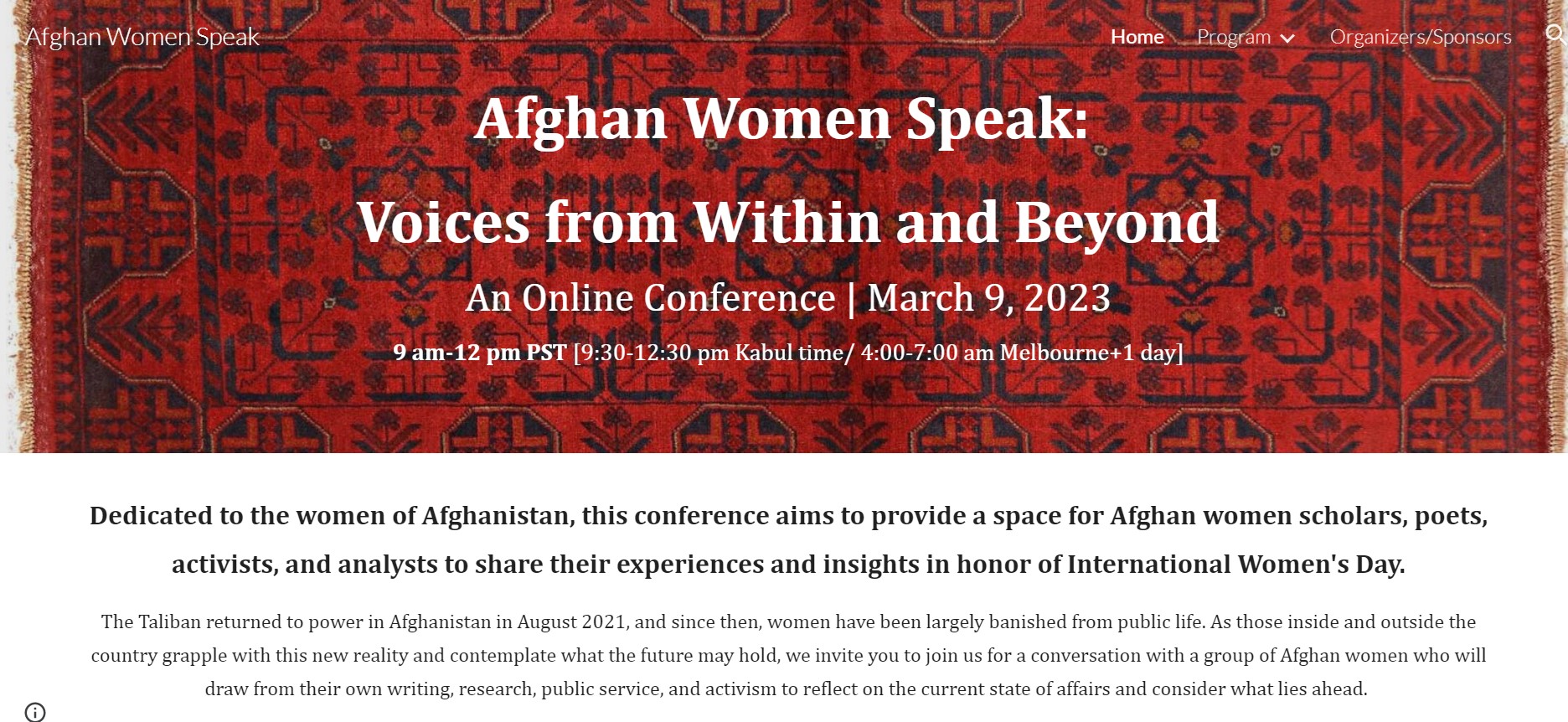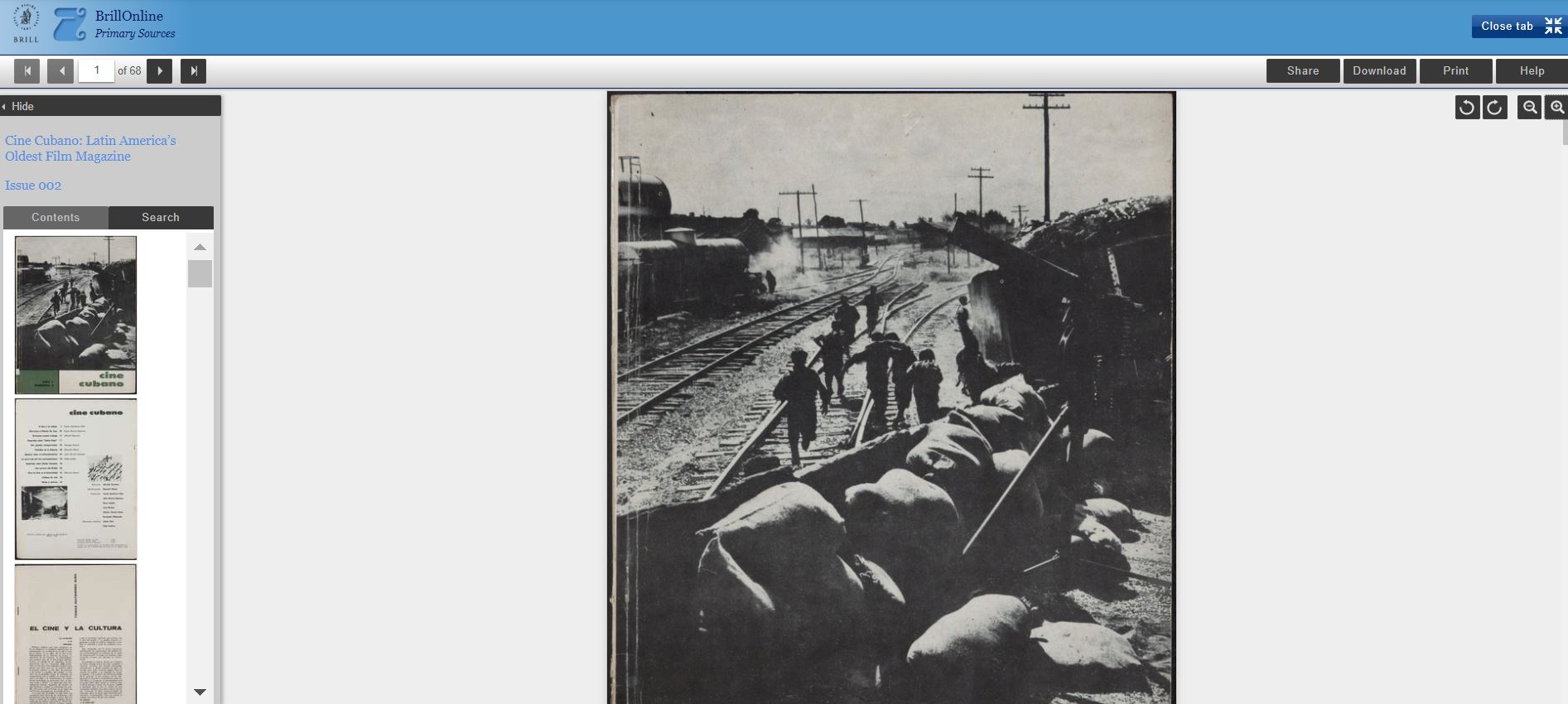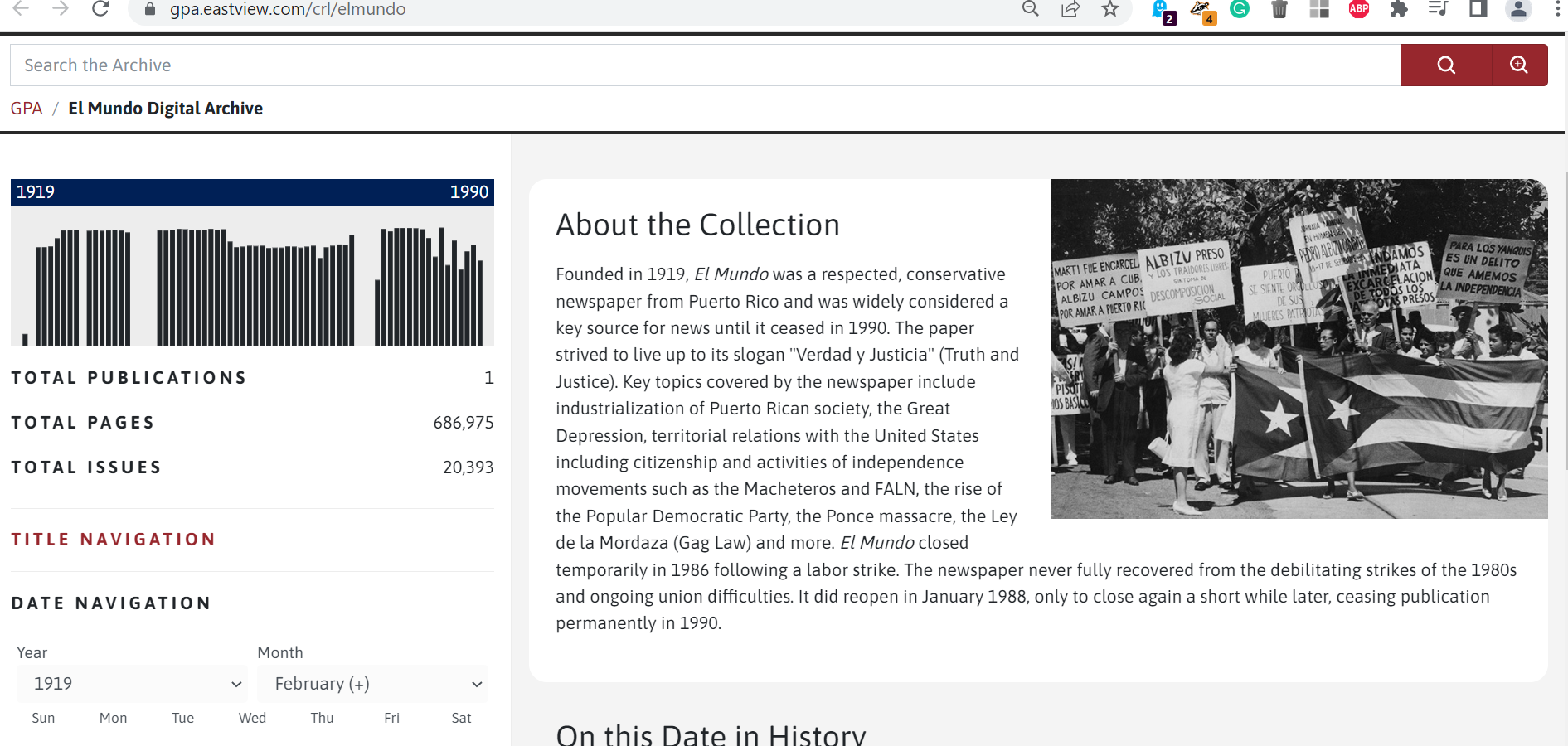Latin American Studies Collections
Curating Literature @UC Berkeley’s Center for Latin American and Caribbean Studies
Curating Literature

This online event on curating literary festivals will feature: Milena Britto, curadora literaria independiente; Natalia Brizuela, curadora y editora independiente; Cristina Fuentes La Roche, Directora, Hay Festival; Mauro Munhoz, Co-fundador y Director FLIP, Festa Literária Internacional de Paraty; Jamille Pinheiro Dias, curadora independente; Amalia Sanz, Directora FILBA, Festival Internacional de Literatura de Buenos Aires.
This event will be in Spanish and Portuguese, with simultaneous interpretation into English
Trial of Cine Cubano ending on March 29 2024
Cine Cubano is a journal that provides valuable insights into Cuban revolutionary cinema and Latin American cinema. It has over 200 issues from 1960 to 2019, covering six decades of film theory, techniques, and reviews. The journal has now been digitized and made available online for the first time, providing unprecedented access to film scholars and students. All 205 print issues have been scanned and included in this new online collection. The scanning was done at the ICAIC Film Institute in Havana, Cuba, where the journal originated. Overall, this is an important new digital resource for studying the history of Cuban and Latin American cinema. The online availability makes decades of film knowledge more accessible.
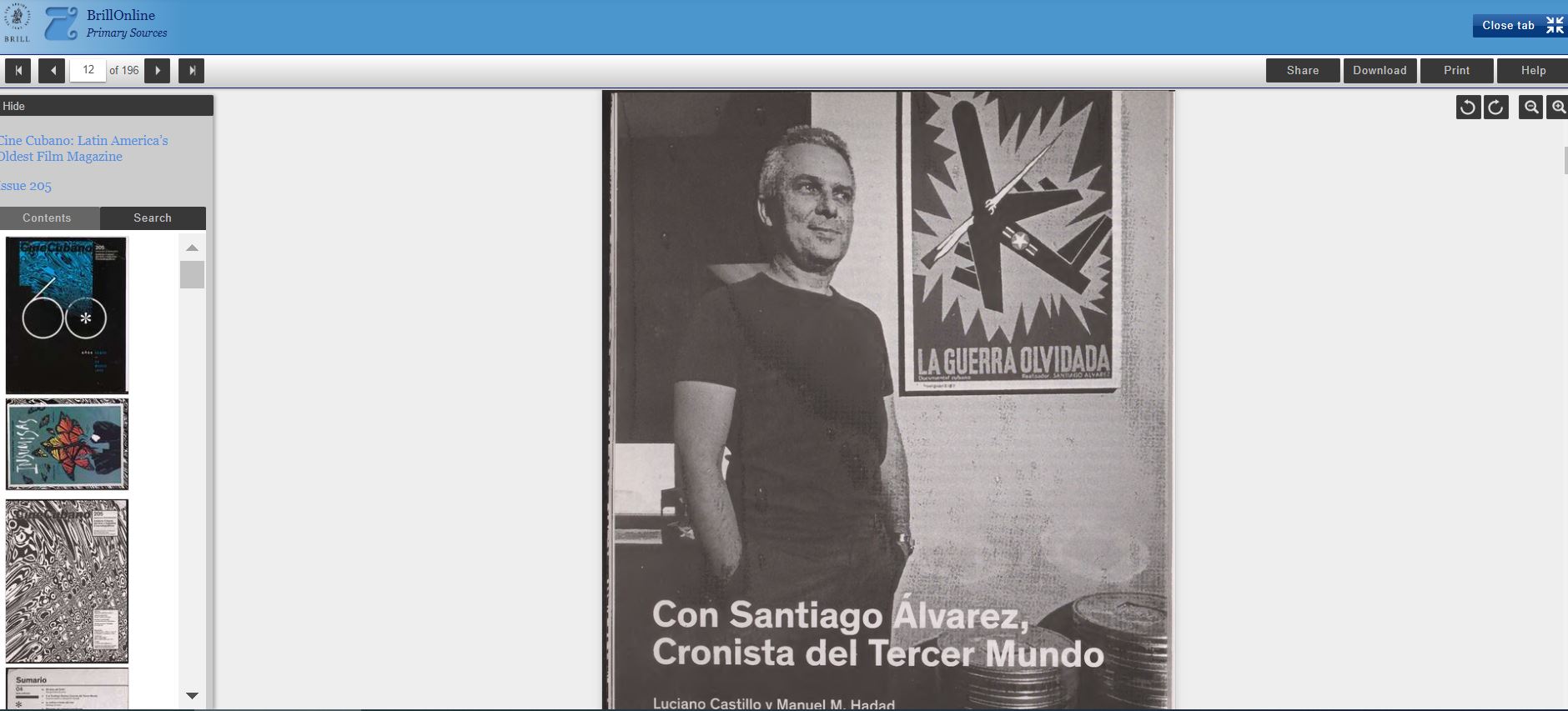
Library purchases digital archive of Prensa Libre (Guatemalan Newspaper): 1951-2024
UC Berkeley Library has purchased ongoing access to Prensa Libre Digital Archive (1951-2024). Prensa Libre is a well-respected Spanish-language Guatemalan Newspaper. It began publishing in 1951, and since then has provided extensive coverage of politics, news, social conditions, history, governance issues, Garífuna, Mayan, and other indigenous communities (Pueblos Originarios en Guatemala), and civil war(s) in Guatemala and Central America.
We hope that this newspaper resource will be of great use to our faculty and students who study Anthropology, Politics Social Sciences, History of Central America, and Latin America.
Prensa Libre digital archive can be accessed from off-campus locations using the proxy or VPN here.
Below is the screenshot of the landing page of the archive. It has a robust search interface.
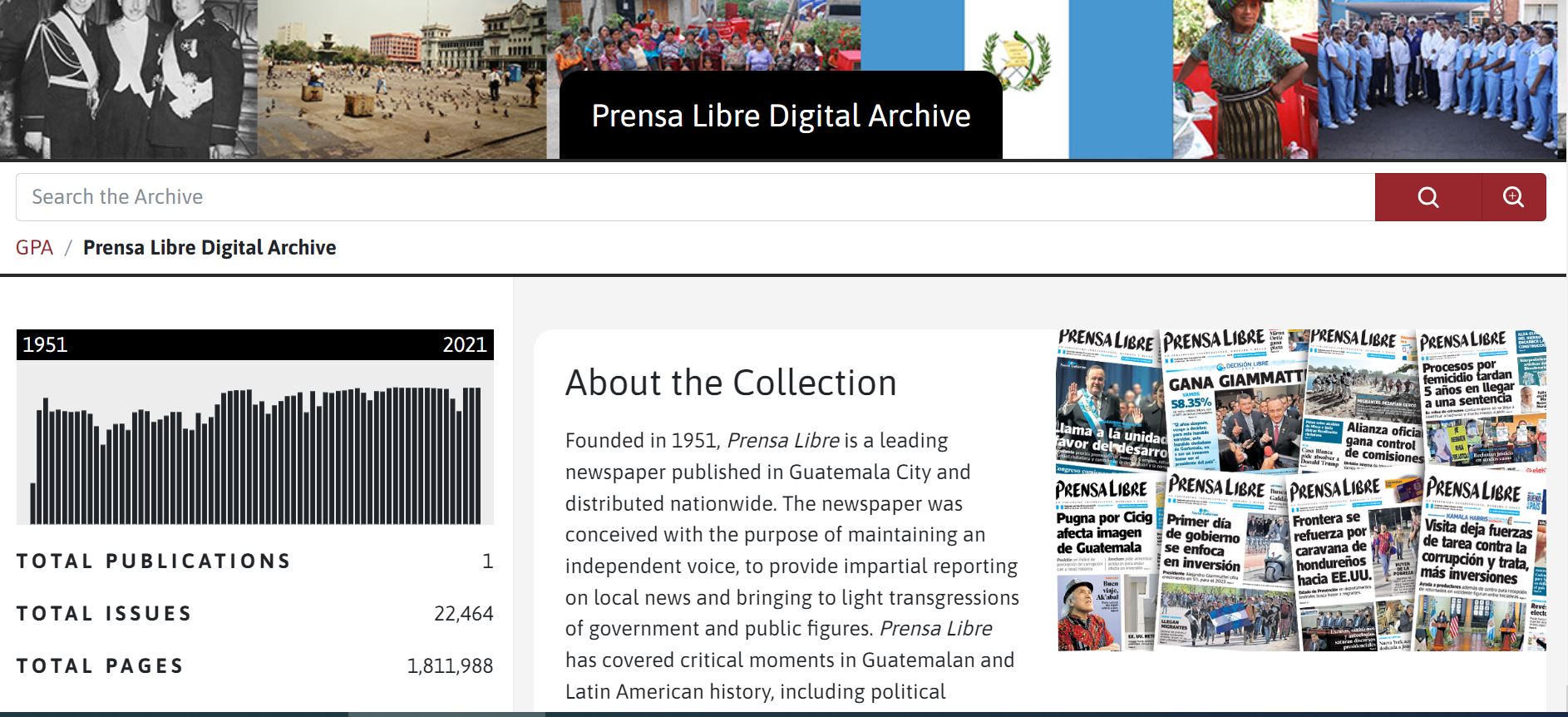
Center for Research Libraries releases Soviet-Era Ukrainian Newspapers Online
Center for Research Libraries in collaboration with the Global Press Archive of East View has released its latest digital collection of select Soviet-Era Ukrainian Newspaper. The collection can be accessed here: https://gpa.eastview.com/crl/seun/ or here
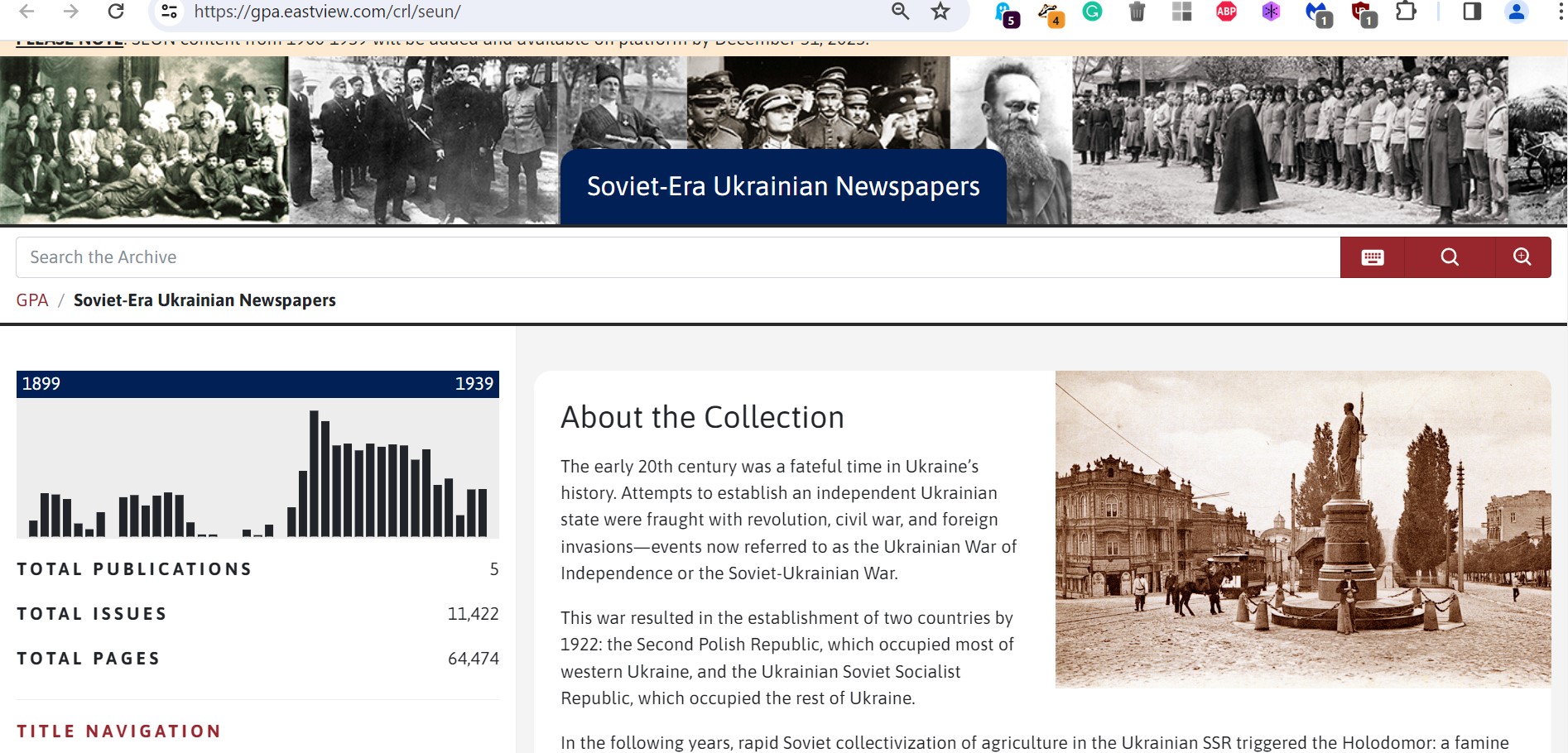
About the collection:
The early 20th century was a crucial time in Ukraine’s history, marked by attempts to establish an independent state, leading to the Ukrainian War of Independence. This conflict resulted in the creation of two countries by 1922: the Second Polish Republic in western Ukraine and the Ukrainian Soviet Socialist Republic in the rest of the country.
Following this, rapid Soviet collectivization in the Ukrainian SSR triggered the Holodomor, a famine that began in 1932 and claimed millions of lives.
The Soviet-Era Ukrainian Newspapers (SEUN) collection, with over 50,000 pages and five titles, documents Ukraine’s history during this turbulent period, including events leading up to WWII. It includes newspapers from Kyiv, Kharkiv, and Lviv, featuring content in both Ukrainian and Russian.
Third annual Hispanic Heritage Month Celebration Webinar at UC Berkeley Library
- Sarah Aponte; Chief Librarian, Dominican Studies Institute, CUNY
- Dr. Irma Guadarrama, former professor/ researcher and writer at Houston University–author of a 2023 book, “To Change the Impossible World: Central American Women in Struggle and Resistance.”
- Kathia Salome Ibacache, Librarian for Romance Languages
- David Woken, Latin American and Caribbean Studies Librarian, University of Chicago
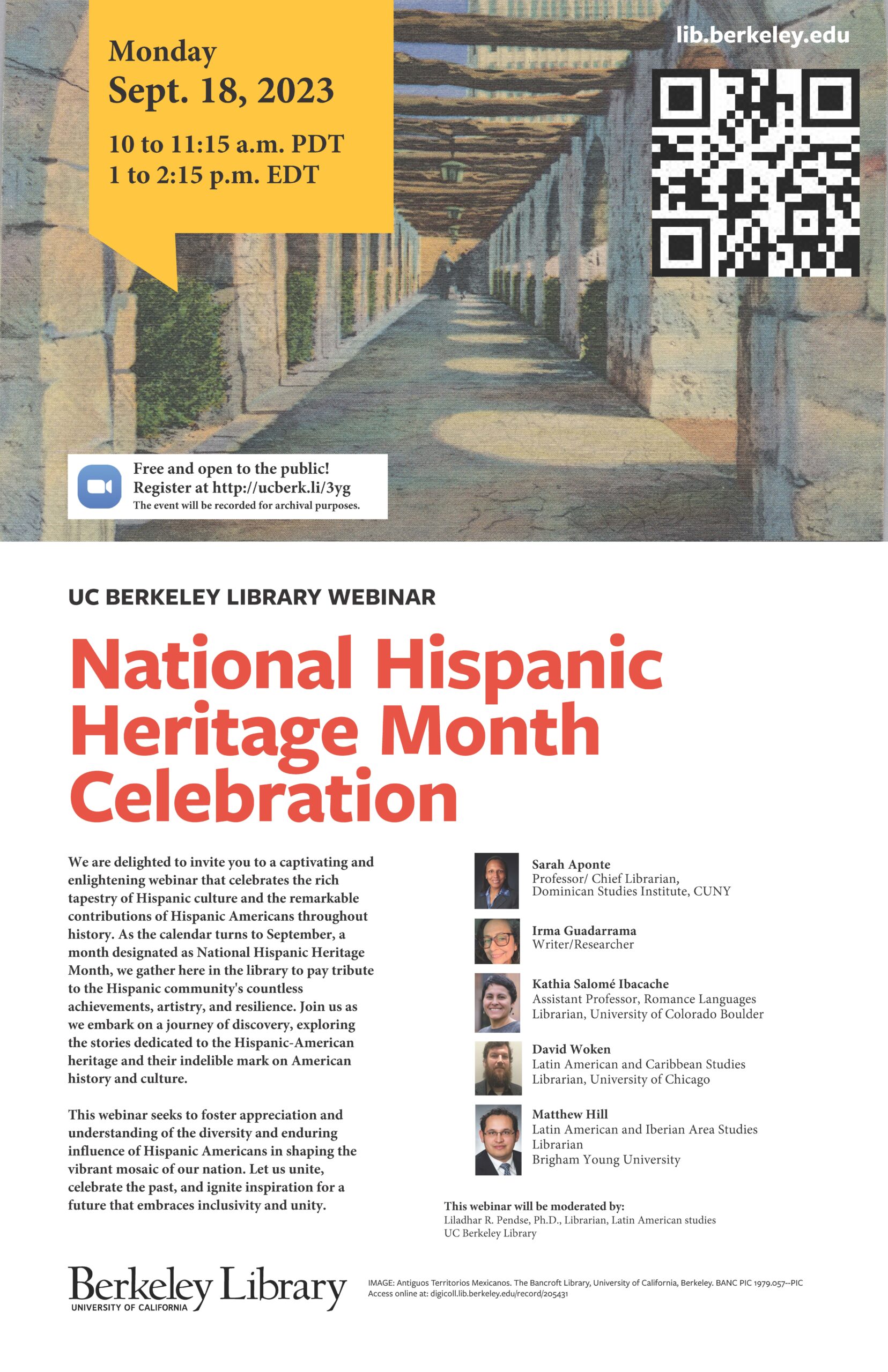
National Hispanic Heritage Month Celebration Webinar 2023 at UC Berkeley Library
Prensa Libre (Guatemalan Newspaper) Archive Trial at UC Berkeley Library
The Library has started a thirty-day trial of Prensa Libre Newspaper. One can access the resource by authenticating from an off-campus location using the following hyperlink: https://libproxy.berkeley.edu/login?qurl=https%3A%2F%2Fgpa.eastview.com%2Fpren%2F
Currently, the full-text content is available for the issues starting in 1980 through 2022.
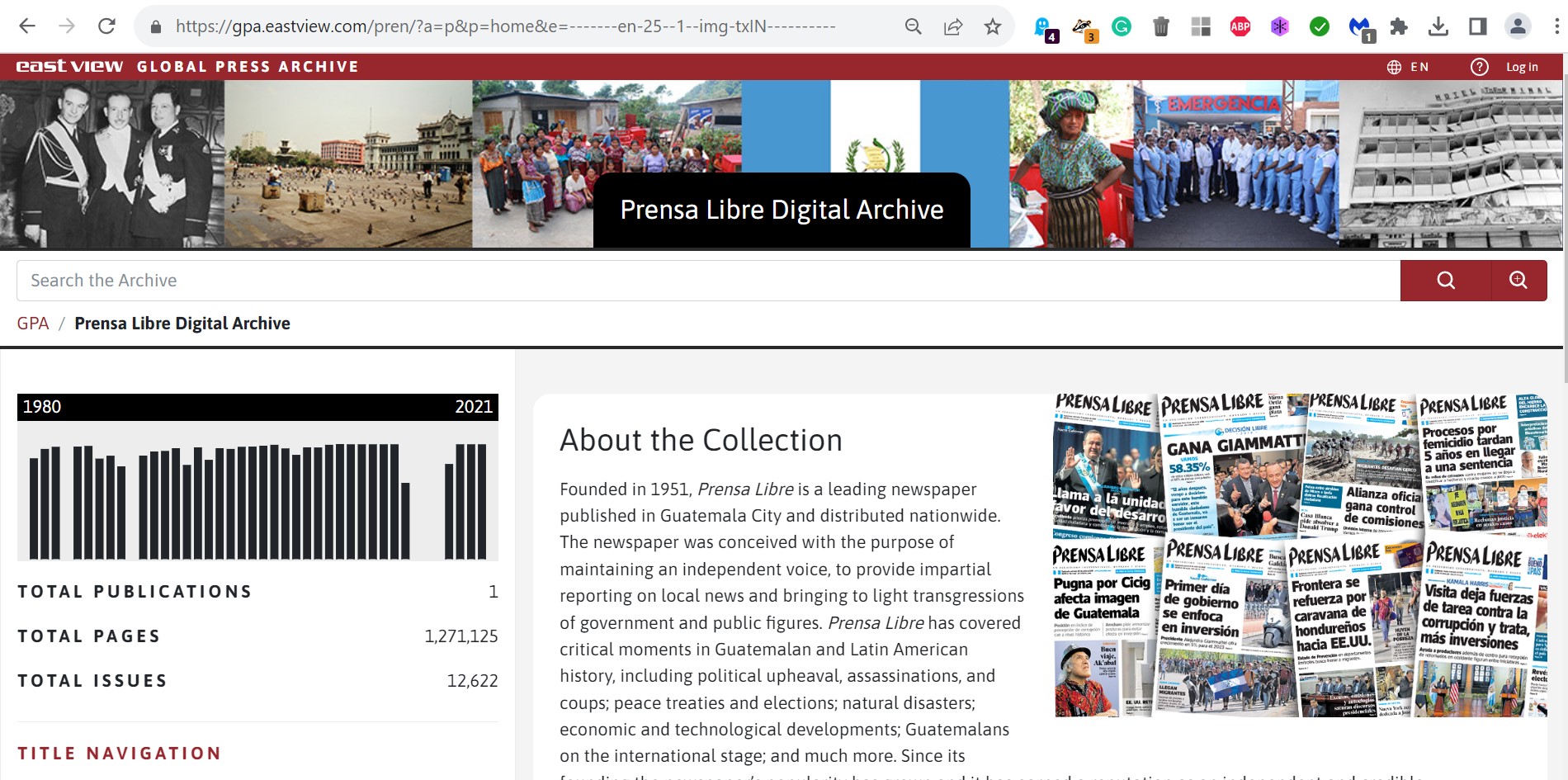
Prensa Libre fue fundado el 20 de agosto de 1951 por Pedro Julio García, Álvaro Contreras Vélez, Salvador Girón Collier, Mario Sandoval Figueroa e Isidoro Zarco Alfasa.
Prensa Libre is a Guatemalan newspaper published in Guatemala City by Prensa Libre, S.A. and distributed nationwide. It was formerly the most widely circulated newspaper in the country and as of 2007 it has the second-widest circulation.[1] It is considered a local newspaper of record. It was founded in 1951. (Source: Wikipedia)
El Mundo Digital Archive (Puerto Rico): 1919-1990 [Open Access]
I am glad to report that the Center for Research Libraries, in collaboration with Eastview’s Global Press Archive platform, has released the full text of El Mundo newspaper published in Puerto Rico from 1919-1990.
Established in 1919, El Mundo was a well-respected and conservative newspaper hailing from Puerto Rico, widely acknowledged as a prominent news source until its cessation in 1990. The publication diligently aspired to uphold its motto of “Verdad y Justicia” (Truth and Justice). El Mundo extensively covered a range of significant topics, including the industrialization of Puerto Rican society, the impact of the Great Depression, territorial relations with the United States encompassing citizenship, activities of independence movements such as the Macheteros and FALN, the emergence of the Popular Democratic Party, the Ponce massacre, the enactment of the Ley de la Mordaza (Gag Law), and more. In 1986 El Mundo temporarily closed due to a labor strike, which inflicted lasting damage on the newspaper. Despite reopening in January 1988, the publication faced ongoing union difficulties and ceased operations permanently in 1990.
Webinar on March 21st: Ukrainian Publishers and Literary Critics Speak
Ukraine Fights On: One Year Later
Ukrainian Publishers and Literary Critics Speak
In this second event, women publishers and literary critics from Ukraine will update us on the current state of publishing, the different strategies they are using to mitigate the tragic circumstances of their war, and how publishing has evolved since the Russian invasion of Ukraine.
Date: Mar 21, 2023
Time: 9:30 am PDT /12: 30 pm EDT/ 19:30 Kyiv Time
Duration: 1 hr. 15 min.
Language of Event: English.
All are welcome with prior registration.
Link for event registration: http://ucblib.link/ukrainefightson2
Speakers
- Iryna Baturevych co-founded the Chytomo media project (NGO), the largest independent media covering publishing and contemporary literary and cultural processes in Ukraine.
- Anastasia Bilousova is an editor and project manager at the RODOVID Press publishing house in Kyiv.
- Lidia Lykhach is the executive editor and founder of RODOVID Press.
Discussant
Aglaya Glebova is an Associate Professor in the History of Art at the University of California, Berkeley.
Organizer: Dr. Liladhar R. Pendse, Librarian for Slavic, East European, and Eurasian Studies
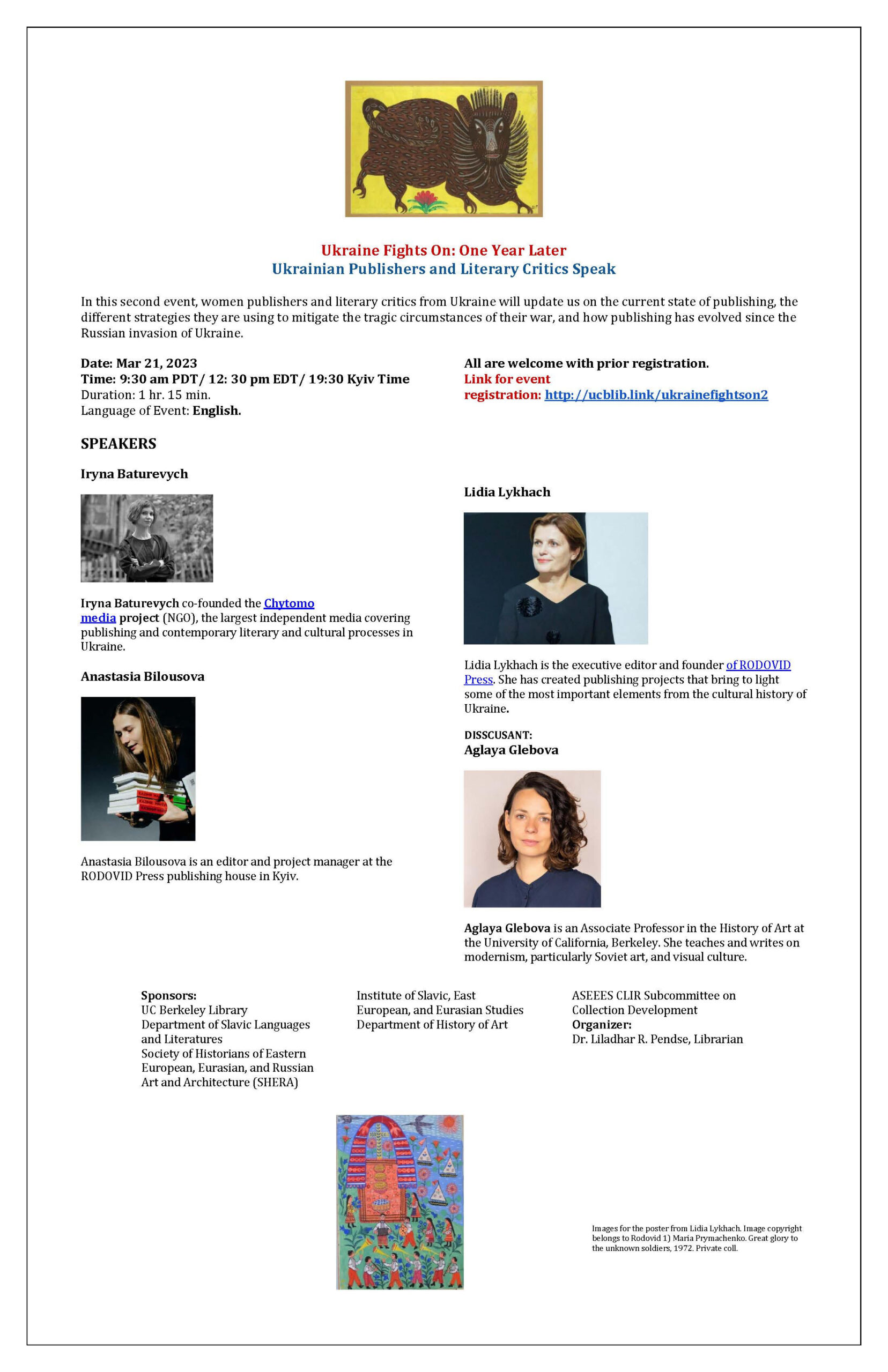
Armeno-Indica: Four Centuries of Familiarity and Friendship Conference at UCLA
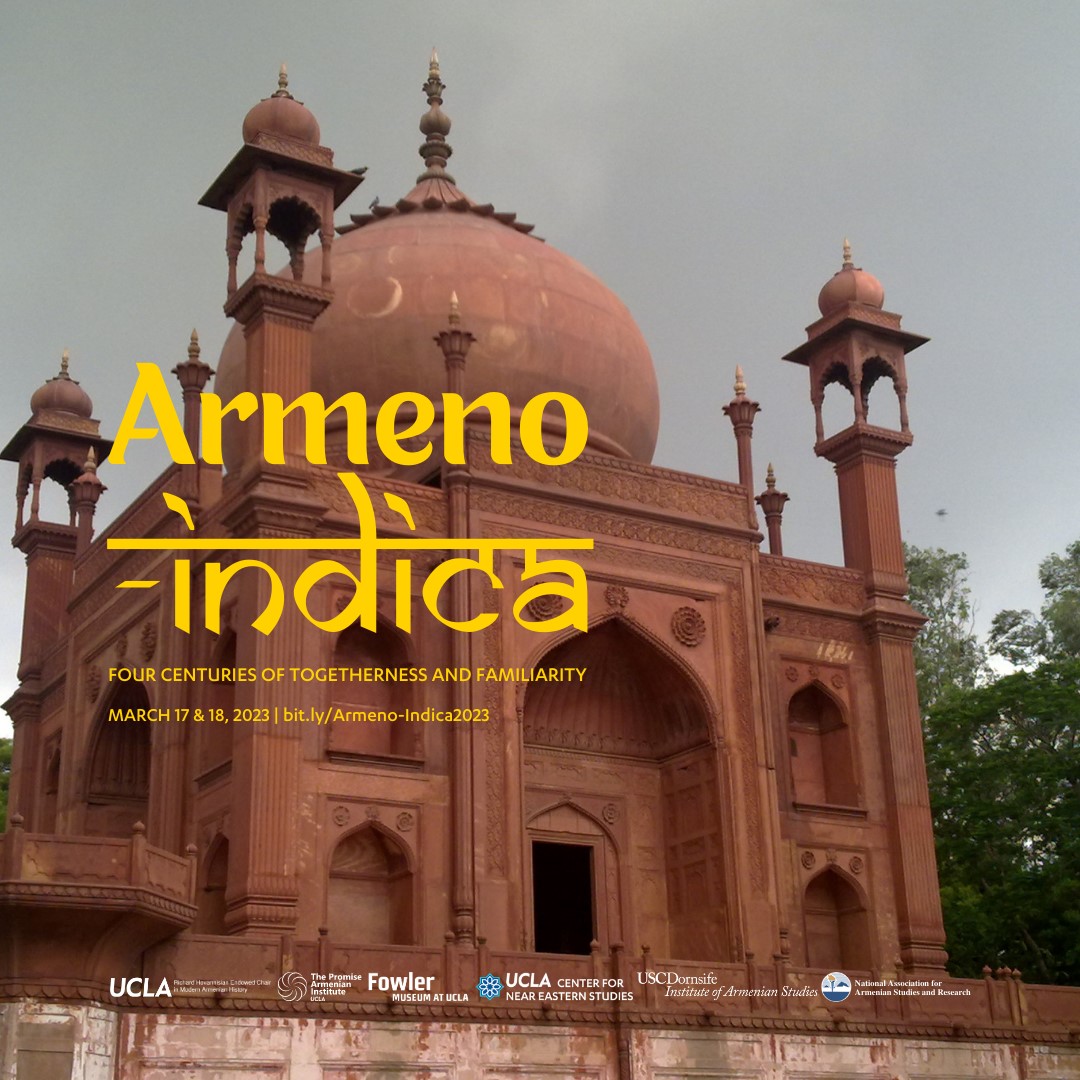
Armeno-Indica: Four Centuries of Familiarity and Friendship
March 17 – March 18
This event is organized by the UCLA Richard Hovannisian Endowed Chair in Modern Armenian History.
Friday, March 17, 2023, | 10:00 AM – 6:30 PM (Pacific Time)
to
Saturday, March 18, 2023, | 11:30 AM – 6:00 PM (Pacific Time)
Postponed due to the pandemic, this international conference celebrates the bicentenary of the founding of Kolkata’s famed Armenian College (est. 1821), one of three centers of Armenian higher learning in the diaspora during the nineteenth century and the only one that has survived and is thriving today. Bringing together economic, literary, legal, and cultural historians from India, Armenia, France, the United Kingdom, Germany, and the United States, the conference highlights how, beginning in the early modern period and continuing to the present, Armenians have traveled to India to make its distant shores and cultures their own. India looms large in the Armenian social imaginary. It was not only the place where the first Armenian proto-constitution for an “imagined” nation-republic was published (Madras 1788/9), it was also the cradle of the first Armenian newspaper (Madras, 1794-1796), the first modern Armenian play (Calcutta 1823), and arguably also where the first Eastern Armenian novel appeared (Calcutta, 1846), as well as where the first Armenian “feminist” tract (Calcutta, 1847) was published.
Gathering an international group of scholars, Armeno-Indica explores the Indo-Armenian saga in South Asia from the seventeenth to the twenty-first centuries. The themes to be explored include the connected economic, literary, legal, and political histories of Armenians and Indians in South Asia and beyond across the waters of the Indian Ocean. The keynote for the conference will be delivered by Professor Sanjay Subrahmanyam.
Please fill out the form for providing RSVP for in-person attendance. The form is located at the following hyperlink: https://sscucla.qualtrics.com/jfe/form/SV_bgcerNdYzuQgRHU
VENUE: UCLA Royce Hall 314 and Fowler Museum
Alternatively, you may attend this conference using zoom with prior. Here is the hyperlink that will lead you to the form that needs to be filled out: http://bit.ly/armenoindica-virtual
Friday, March 17, 2023 (Royce 314, UCLA)
Welcoming words: Amy Landau and Ann Karagozian
(10:00 AM – 10:15 AM)
Introduction to the conference: Sebouh David Aslanian
(10:15 AM – 10:30 AM)
Panel 1: Trade, Law, and Go-Betweens (10:30 AM – 12:30 PM)
Santanu Sengupta (Kolkata): “Negotiating with Law: Phases of Armenian Interaction with the Early Colonial Law Courts in India.”
Xabier Lamikiz (University of the Basque Country /Euskal Herriko Unibertsitatea (UPV/EHU): “Armenian Merchants from Madras in Eighteenth-Century Spanish Manila: A Story of Love and Hate.”
Ruquia Hussain (Aligarh Muslim University, AMU): “Of Sarhad and Calcutta: The English East India Company, Khwāja Israel di Sarhad and the Foundation of Modern Calcutta.”
Sona Tajiryan (Gemological Institute of America, GIA): “How to Choose and Buy Pearls? An Eighteenth-Century Armenian Guide on the Pearl Trade in India (1730s).”
Discussant: Glenn Penny (UCLA)
Lunch Break: Balcony of Royce 306 (12:30 PM – 1:30 PM)
Panel 2: Language and Literary Revival (1:30 PM-3:00 PM)
Ahona Panda (Claremont McKenna): “Ajab Shahar Calcutta: The Outsider in the Bengal Renaissance.”
Talar Chahinian (University of California, Irvine): “Mobilizing Subjectivity in the Practice of the Nation: Tagheadeants‘s’ Case for Women’s Education.”
Peter Cowe (Near Eastern Languages and Cultures, UCLA): “Intertextuality and Innovation: Mesrop Taghiadeants‘ and his Experimentation with the Novel Genre in Comparative Perspective.”
Discussant: Houri Berberian (University of California, Irvine)
Coffee Break: (3:00 PM – 3:15 PM)
Panel 3: Armenian Historiography and Print Culture in Madras (3:15-5:00PM)
Martin Adamian (UCLA, graduate student): “Mesrovb J. Seth, Father of Indo-Armenian Historiography.”
Anna Sirinian (Dipartimento di Storia Culture Civiltà, Università di Bologna): “Azdarar (1794-1796): The First Armenian Periodical in the World.”
Hasmik Kirakosyan (Senior Researcher, Mashtots Repository of Manuscripts, Yerevan): “Harutiwn Shmavonean an Armenian Printer-publisher in Madras and a Farman for Printing in Arabic script in Madras.”
Discussant: Nile Green (UCLA)
Panel 4: History in the Present (5:00 PM – 6:30 PM)
Armen Arslanian: (Warden of the Armenian Church of Dhaka, Bangladesh): “The Armenian Church of Dhaka (Bangladesh) and the task of Heritage preservation.”
Vache Tadevosyan: (Community leader, Kolkata, India): “The Mardasirakan Jemaran (Armenian College of Kolkata) and its Bicentenary.”
Satenik Chookaszian (Armenian National Gallery in Yerevan): “Sargis Katchadourian’s reproductions of India’s cultural gems from the collection of National Gallery of Armenia.”
Chair and Discussant: Armen Baibourtian
Saturday, March 18, 2023 (Fowler Museum, UCLA)
Check-in at Lenart Hall (11:30 AM – 12:00 PM)
Welcoming remarks: Amy Landau
Panel 1: Monuments, Patronage, and Indo-Persianate Identities (12:00 PM – 2:00 PM)
Sebouh David Aslanian (Department of History, UCLA): “Cemeteries as Heterotopias: Armenian Sepulchral Culture in Agra and Surat, or what the Dead can tell us About the Living.”
Talinn Grigor (Department of Art History, UC Davis): “‘Transimperial’ Strategies of Artistic Patronage: From New Julfan Merchants to Parsi Industrialists.”
Veronika Zablotsky (Freie Universität, Berlin): “Orientalism and the Making of the Armenian Diasporic Imaginary in Early Colonial India.”
Discussant: Peter Cowe (UCLA)
Panel 2: The Historical Imagination and the Circulation of Revolutionary Ideas in Late 18th Century South India (2:00 PM – 3:30PM)
Michael O’Sullivan (The European University Institute, Florence): “Portfolio Capitalism and History-Writing in Hagop Simonean Ayubeant’s Life of Haydar Ali Khan, c. 1782-1795.”
Ayal Amer (UC Irvine): “Fitna and Patriotism in Late 18th century Madras.”
Satenig Badwagan Toufanian (Inalco, Paris): “The Snare of Glory: A Call for Freedom from Madras.”
Discussant: Sebouh D. Aslanian
Intermission: Lemonade, Cookies, and Open Galleries in Courtyard (3:30 PM – 4:40 PM)
Keynote Address (4:40 PM – 5:40 PM)
Sanjay Subrahmanyam (Distinguished Professor & Irving and Jean Stone Endowed Chair in Social Sciences): “Armenians and Others in Mughal Surat: Rethinking Communities, Collaboration and Conflict.”
Reception on the Terrace (6:00m – 7:30 pm)
ORGANIZERS
- UCLA Richard Hovannisian Chair of Modern Armenian History
- Fowler Museum at UCLA
- Armenian Studies Center at the UCLA Promise Armenian Institute
- USC Dornsife Institute of Armenian Studies
- National Association for Armenian Studies and Research (NAASR)
- UCLA Narekatsi Chair in Armenian Studies
- UCLA Center for Near Eastern Studies
Happy International Women’s Day and Conference Dedicated to International Women’s Day!
In many of the world, we enthusiastically celebrate International Women’s Day. We were not aware then of Valentine’s Day and scamming of flower prices then. While the questions surrounding diverse values, gender identities, and contemporary politics are complicated, it is important to note that for many in the world, the basic human rights that we take for granted in the United States are beyond reach. I have been asked today to post a courtesy conference that is not affiliated with our library in which I will participate as a member of the organizing committee in my private capacity. The conference is dedicated to women of contemporary Afghanistan.
The conference will occur tomorrow, March 9th, from 9 am PST through 12 noon. The website for the conference is Afghan Women Speak: Voices from within and beyond. The conference is FREE and OPEN to all with prior registration.
